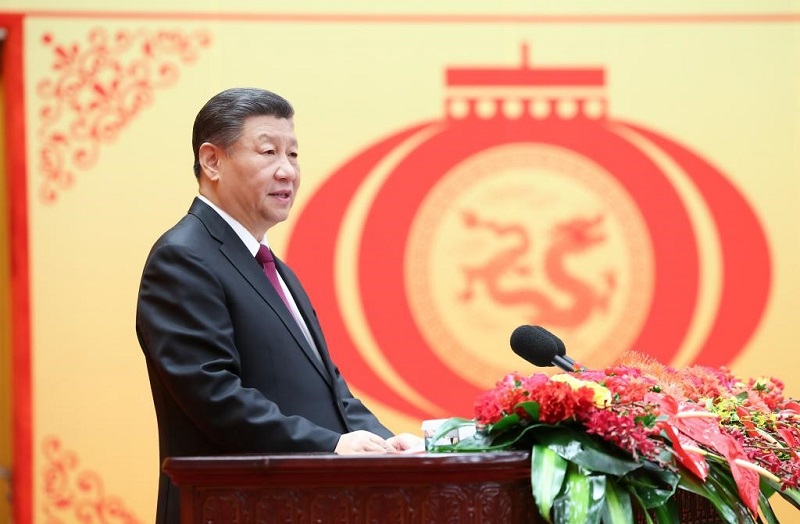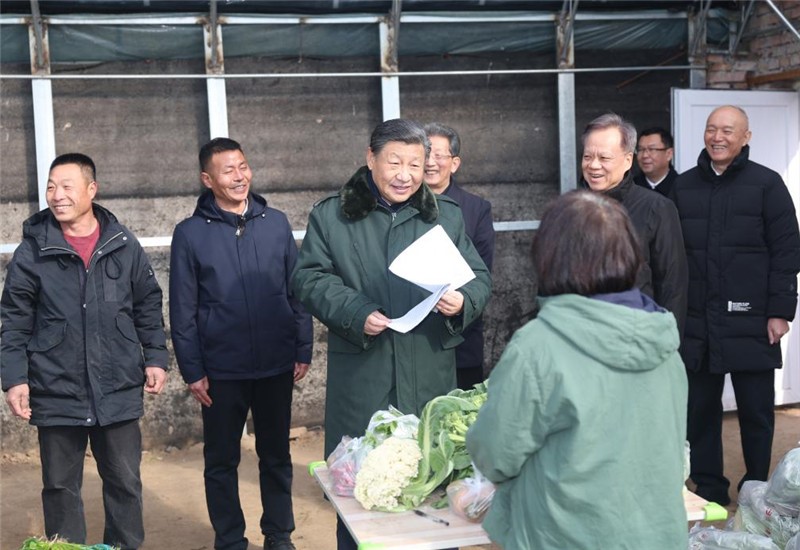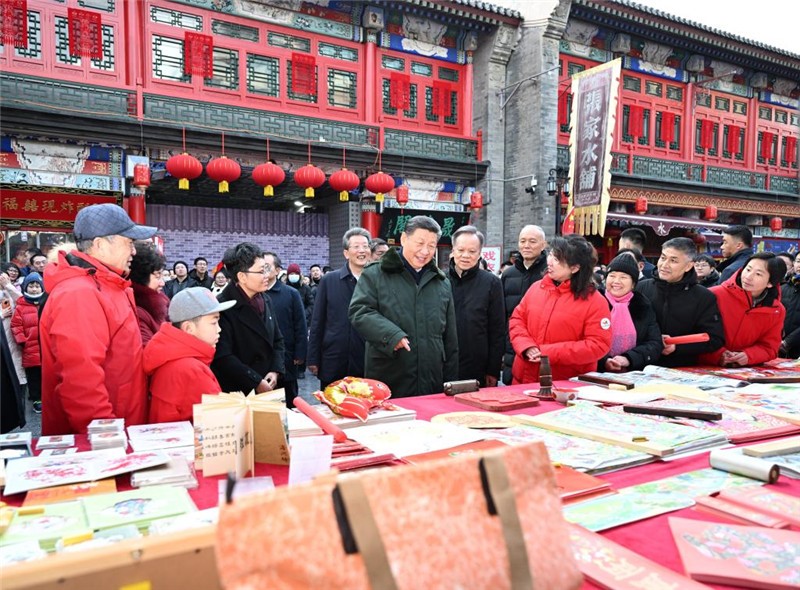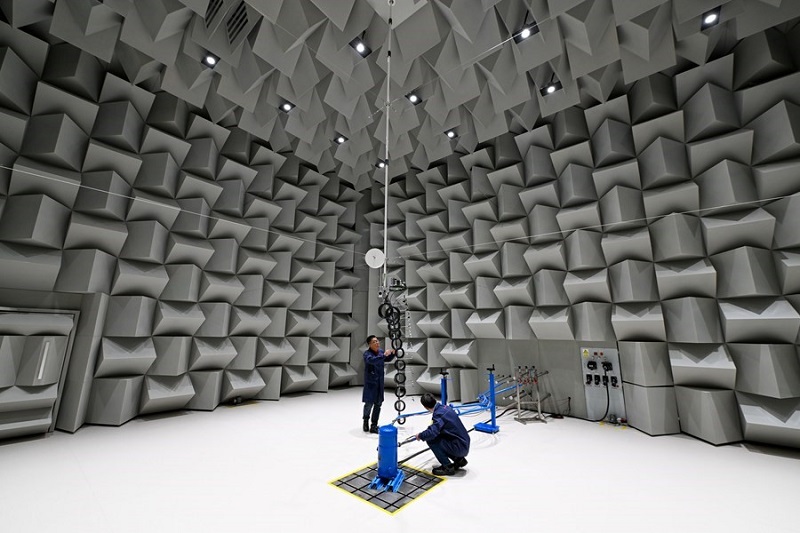President Xi Jinping extends Spring Festival greetings to all Chinese citizens, calling for efforts to write a new chapter in the advance of Chinese modernization.
The eight-day-long Spring Festival holiday saw a tourism boom across the country whose blend of pop and traditional culture illumined Lunar Chinese New Year celebrations. Local Beijing authorities attest to the 100 or more cultural events staged in the capital’s parks during the Spring Festival holiday that enriched its abundantly festive ethos. Temple fairs, enshrining such live folk art activities as calligraphy, lantern-making, shadow-puppetry, and sugar-figurine blowing, in particular drew droves of visitors.
As the Year of the Chinese Dragon (also known as loong) gathered pace, dragon-themed cultural relics from different historical periods of ancient China which were exhibited at museums located in Beijing, Heilongjiang, and Shaanxi, among others, captured the spotlight. Exhibits included bronzeware, jade artifacts, porcelain items, gold and silverware, lacquerware, and paintings, all of which trace the cultural and historical origins of the Chinese dragon and explore its cultural connotations.

Chinese President Xi Jinping, also general secretary of the Communist Party of China (CPC) Central Committee and chairman of the Central Military Commission, delivers a speech at a Spring Festival reception at the Great Hall of the People in Beijing, capital of China, Feb. 8, 2024. (Xinhua/Ju Peng)
As the Chinese nation’s totem, the dragon is deemed strong, fearless, and benevolent, Chinese President Xi Jinping observed on February 8, 2024 at a reception in Beijing, where he extended Spring Festival greetings to all Chinese people. Xi went on to emphasize how the dragon not only embodies the spirit of the ceaseless pursuit of self-improvement, hard work, and enterprise of the Chinese nation over 5,000 years, but also demonstrates the determination and aspiration of hundreds of millions of Chinese people to build China into a strong country and realize national rejuvenation.
Wishes for a Better Life and a Brighter Future for the People
Since taking up the Party’s top post in November 2012, Xi has made spending time with people ahead of the Spring Festival, especially those in disadvantaged and vulnerable groups, and extending festive greetings to them a tradition.
Prior to the 2024 Chinese New Year, from February 1 to 2, President Xi visited Tianjin. One of his destinations was Diliubu Village in Xinkou Township, Xiqing District of Tianjin, which last summer suffered severe floods. Upon entering a greenhouse to see how its vegetables were faring, Xi asked local farmers detailed questions about how greenhouses had been restored, and the sales of their vegetables. He praised local residents for their rapid response, self-reliance, and self-motivation when the floods subsided in proactively organizing production and seizing the opportunity to cultivate vegetables in as many fields as possible.

Chinese President Xi Jinping talks with a farmer in a greenhouse when learning about the recovery of farming activities after last year's floods in a village of Xinkou Town in Xiqing District of north China's Tianjin Municipality, Feb. 1, 2024. [Photo/Xinhua]
Xi entered the house of villager Du Honggang – home to four generations of his family. Xi sat down with the family and asked them about their life. He calculated the financial losses that floods had inflicted on the family, along with their post-flood production revenues and additional income from employment. Du told the president that although his family’s 10 mu (about 0.67 hectares) or more of corn fields and vegetable patches indeed suffered damage from the flood, it was, with the Party and the government’s help, swiftly remedied. The swift repair of their vegetable greenhouses, in particular, enabled a good harvest of seasonal vegetables. As the Spring Festival drew close the family stocked up on a good selection of festive items, and thanks to various cultural events arranged by the village, a mood of cheerful anticipation suffused its residents. In quoting a Chinese idiom about national prosperity and social harmony, Xi noted that a country is prosperous only when its people live in peace.
These annual pre-Spring Festival inspection tours have brought the president to such places as the border area of southeast China’s Yunnan Province, a mountainous rural area in Sichuan, and a subway construction site located more than 20 meters underground in Beijing. “I care particularly about grassroots officials and the people as we ring in the Lunar New Year,” Xi once said.
In February 2013, while inspecting Dingxi in northwest China’s Gansu Province, and after tasting the brackish, salty water at one villager's home, Xi urged greater efforts to enable its people soon to drink clean, sweet water from the Taohe River.
During his inspection of Desheng Village, Zhangjiakou, Hebei Province in January 2017, Xi visited the home of farmer Xu Haicheng, and talked with the family about how they could escape poverty.
“To secure a better life for our people is the original aspiration and purpose of the Chinese Communists,” Xi said during his trip to Sichuan in 2018. This spirit has remained an unchanging principle of Xi's pre-festival inspections, vividly embodying the “people-first” philosophy of governance.
Carrying Forward Fine Culture
President Xi observed during his inspection tour of Tianjin that culture should enlighten and bring tangible benefits to people, add elegance to a city, promote its industries, and provide its unique characteristics. Such features are what a city is meant to achieve in its endeavors to inherit and develop its culture, as well as to foster and nourish its urban civility.
On the afternoon of February 1, Xi arrived at Tianjin's Ancient Culture Street. Walking along that quaint thoroughfare, among the several unique shops he stopped by to ask about sales of products and their inheritance and development of traditional cultural heritage were Guifaxiang 18th Street Mahua, Nut Products Zhang, Clay Figurine Zhang, and Yangliuqing New Year Painting.
Xi said that Chinese modernization cannot be achieved without the inheritance and promotion of fine traditional culture; that it is necessary to protect the distinct characteristics and charm of the city of Tianjin and make good use of its historical and cultural blocks in such a way as to enhance the beauty of this modern metropolis.

Chinese President Xi Jinping talks with the crowd while visiting an ancient cultural street in north China's Tianjin Municipality, Feb. 1, 2024. [Photo/Xinhua]
Meanwhile, the city’s streets resounded with drums and music, and were animated by dragon and lion dance performances. Upon the president’s approach, the crowd erupted into hearty cheers. Xi extended New Year greetings to the people of Tianjin and of all China’s ethnic groups. Xi said that the beaming countenances of local residents and tourists as they enjoyed traditional folk performances filled him with the Lunar New Year spirit. Xi hence urged local governments to organize more such cultural activities that the people so relish to ensure that they enjoy to the full this most important of festivals.
During previous inspection tours in advance of the Spring Festival, President Xi has joined in with local people’s observance of Spring Festival customs. This has prompted his call on them to protect and advance their regional culture in order to prosper from the cultural industry.
In January 2020, he paid a visit to Simola Wa Village, a 500-year-old Wa ethnic village in Tengchong City, southwest China's Yunnan Province. Standing in the village square, he beat a wooden Wa drum three times, in accordance with local customs, to wish for a bumper harvest, peace, and prosperity.
Before the Spring Festival of February 2021, Xi traveled to a small mountainous village in southwest China's Guizhou Province whose inhabitants are people of the Miao ethnic group. There he entered a workshop that had been set up to help local craftspeople escape from poverty. Its exquisitely hand-embroidered Miao garments and handcrafted ornaments caught his attention.
“Miao embroidery is traditional, but it is also fashionable,” Xi observed, and encouraged its exponents to carry forward their craft.
Leverage Innovation to Speed Up the Development of New Productive Forces
In his speech delivered on February 8, Xi noted that in the past year the country’s total economic output exceeded RMB 126 trillion, and its grain output set a new record high, while employment and price levels remained generally stable. China thus presented itself as a standout in the global context. He went on to highlight new breakthroughs made in scientific and technological innovation, and the rapidity with which new productive forces had taken shape as reform and opening up continuously deepened.
During his inspection tour of Tianjin, Xi said that, as an advanced manufacturing, research and development base, the municipality should give full play to its advantages, among others, of rich scientific and educational resources by striving to lead the development of new productive forces. He called on the city to attach equal importance to scientific and technological and industrial innovation, to strengthen the building of parks for sci-tech innovation, to further integrate the digital economy with the real economy, and to promote high-end, smart and green development of its manufacturing sector.

This photo taken on May 10, 2023 shows staff members working at a testing room at the Danfoss Global Green Refrigerants Compressors Laboratory in Tianjin, north China.(Xinhua/Sun Fanyue)
Observers note the importance Xi has attached to “new productive forces” on the aforementioned two occasions. While presiding over a group study session of the Political Bureau of the Communist Party of China (CPC) Central Committee on January 31, 2024, Xi stated that, “Developing new productive forces is an intrinsic requirement and an important focus of promoting high-quality development, and it's necessary to continue to well leverage innovation to speed up the development of new productive forces.” He then went on to stress that high-quality development is an unyielding principle in the new era.
New productive forces mean advanced productivity that has been freed from the traditional economic growth mode and productivity development paths, and which now features high-tech, high efficiency, and high quality, in line with the new development philosophy, Xi said.
New productive forces are driven by revolutionary technological breakthroughs, innovative allocation of production factors, and deep industrial transformation and upgrading; they take the improvement of workers, the means of labor, subjects of labor, and their optimal combinations as their basic connotation, and a substantial increase in total factor productivity as their core hallmark, Xi said.
He called for efforts to deepen reforms of the economic system and the science and technology management system, to work hard towards removing the bottlenecks that hinder development of new productive forces, and to establish a high-standard market system. All this is with the aim of injecting vigor into Chinese modernization.
Most of China’s provincial-level governments have explicitly pledged in their 2024 work reports to either foster or to expand “new productive forces,” outlining the specific areas where new productive forces are to be anchored. The economic powerhouse of Guangdong Province in south China seeks to boost new productive forces in industries that include integrated circuits, new energy storage, and commercial spaceflight. It also plans to foster future industries such as 6G technology and humanoid robots.
As to the incoming Year of the Dragon, President Xi expressed great confidence, and called on the country to embrace the spirit of vitality and determination that the dragon embodies. “With great momentum and ambition, we will explore new ground with hard work and dedication, collectively writing a new chapter in advancing Chinese modernization,” Xi said.
(Based on Xinhua reports)